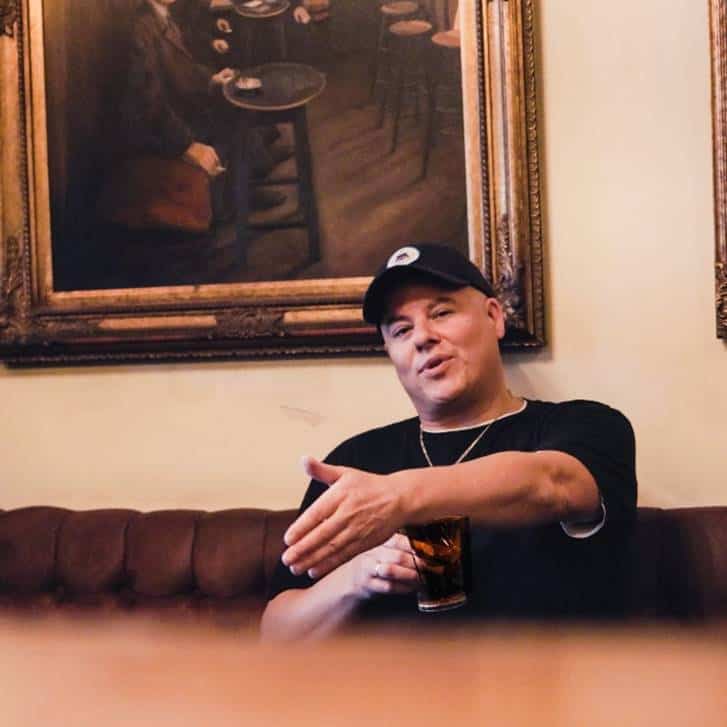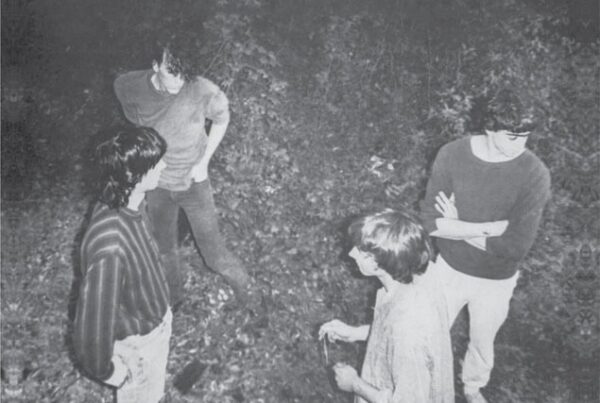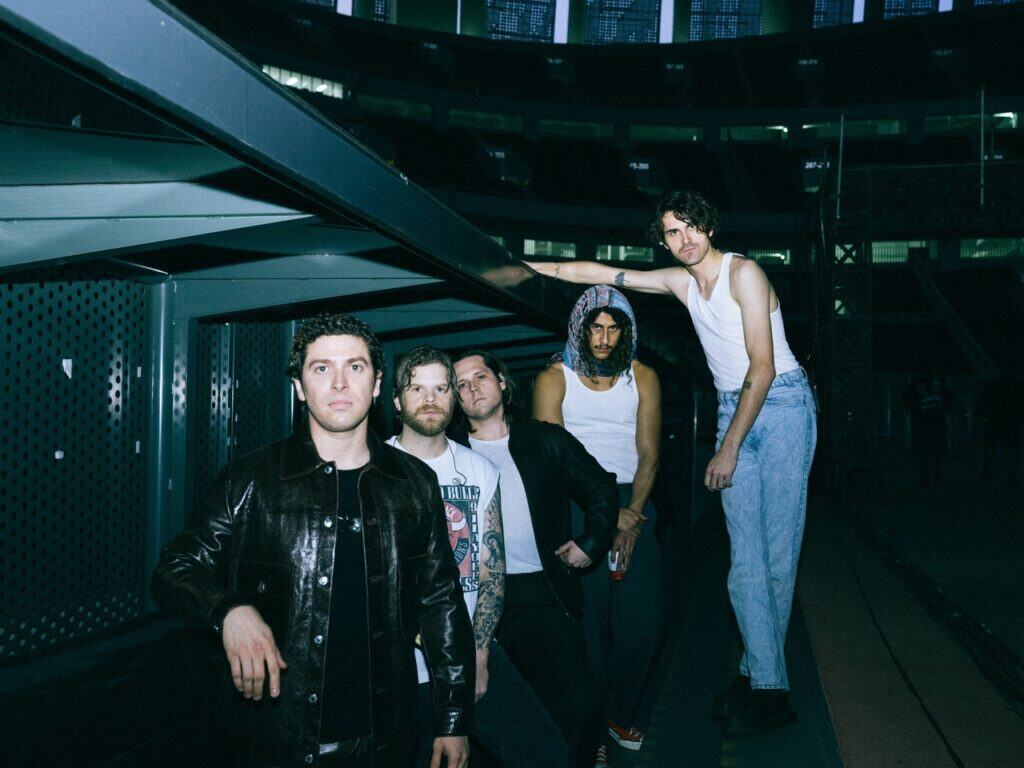“To be honestly reflective, I find it very difficult even right now in this interview you know to debate, do I tell the truth or do I not. But for real, do I tell the truth, do I tell what really happened, or do I tell the surface story that’s not going to offend anybody?”

Steve “Liquid” Hawley is a man who has lived a thousand lives. From being a member of Canadian alternative rock and hip-hop collective Bran Van 3000 to being an athlete, poet, sports coach and everything in between, he sure has a lot of stories to tell.
Speaking to Soundsphere’s Dom Smith, Hawley allows himself to be vulnerable in discussing his successes, losses, upbringing, and legacy. Reflecting on his humble beginnings and looking towards the future with his new solo project, Liquid LTD, Hawley hopes to raise awareness to issues that are so often overlooked.
“My grandmother had given me a pen and a pencil when I was eight years old and she said this, use this, this is your weapon this is your tool, and I remember writing my first poem and then my grandma put me on the table and kind of overruled my mother you know what I mean, because I’d written a poem that everybody liked and they jammed along to,” says Hawley.
Growing up facing constant adversity, Steve (Liquid Ltd) found solace in poetry, a vehicle for him to be able to express his emotions and escape from the abuse and neglect he suffered at home, “I was in an abusive home right, my mother was ill and she was an alcoholic, a raging alcoholic. She’d wake and drink rye and I know that’s going to upset some people but it is what it is. She would buy a bottle of rye and have that for breakfast instead of feeding her child, right?
So it was powdered milk and I had to figure out how to mix it and you know, take whatever was in the cupboard. She lost a lot of her life and it came with abuse and there wasn’t an outlet for help.”
Despite being able to let himself go, to an extent, through his poetry it still wasn’t completely safe for him. Growing up in an extremely athletic environment Hawley often struggled with the lack of understanding from others towards his poetry. Feeling as if he couldn’t be honest with himself for fear of being judged on preconceptions about poetry from others, it wasn’t a truly freeing outlet. Until music was involved.
“Music changed that because it wasn’t just poetry. Music kind of gave wings to the words which made it a little safer for me, but poetry wasn’t safe at the time. There was that conflict and that battle was always there, poetry carried a negative thing with it.
People think what are you going to do put food on the table with poetry or whatever so I became very guarded with it and I guess kind of got lost in abstractions often where I understand my metaphors and I put it out to the world and you realize that not everyone’s going to understand what you’re trying to say and trying to make them understand isn’t necessarily the purpose of sharing or getting a message out, it’s just maybe interpretation for everybody. As long as I believe in what I write, and I know what I write then I guess it’ll be okay. It’s a double-edged sword because it is a battle consciously and spiritually that’s why I said the consequence of a lack of consciousness, so I’m conscious of the consequences of not telling the truth.”
Thinking back to his childhood and early influences, Hawley notes that he didn’t really know much about music or the musicians he was listening to, he just knew that he was able to connect with them through their music and lyrics: “ I grew up on mixtapes. In that era of the early 80s right two you’re 11 or 12 years old and you hear music that you’re getting from mixtapes from other sources so you don’t know necessarily who the artists are,” reflects Hawley. “I came from a background of Athletics. I wasn’t from a musical background where I didn’t know the names of bands, I just knew music but I didn’t know who the hell was singing it. So I wasn’t out purchasing CDs or all that, and my grandmother was kind of very against media and buying and purchasing in magazines because she was of a Celtic background where if it wasn’t community and in the kitchen then it was just dismissed. Stay away from propaganda she used that word a lot.” This lack of musical knowledge would later become an area of contention between Hawley and the other members of Bran Van 3000.
Bran Van 3000 released their first single, Drinking in L.A., in February 1996. With the release of this song the band were quickly thrust into the spotlight, Hawley notes, “You’re thrust into a spotlight and you’re not sure quite what to wear I mean it became so much about how you’re dressed. I said at one point in one of my poems like you know it matters more what you’re wearing and how you dress than it does the mess that you’re talking about in the first place, right?
“A lot of people get concerned about image more than the spirituality of what music is.” Undoubtedly their biggest single, Drinking in L.A. peaked at number 35 on Canada’s RPM top singles chart and was also nominated for the Single of the Year, that same year Bran Van 3000 also released their debut album Glee. This record went gold and won a Juno award for the best Alternative Album in 1998. With so much success, it was only natural that Bran Van 3000 would sign a record deal. And so, after signing with Capitol Records, the band embarked on a massive touring schedule, with stops at H.O.R.D.E. festival and Endfest, as well as opening for the likes of Pulp, Björk, Massive Attack and Moby. In July 1998, Drinking in L.A. reached number 36 in the UK Singles Chart and after its re-release in 1999 after being featured on a popular advert for Rolling Rack it peaked at number 3 in the UK.
Reminiscing on Bran Van 3000, Hawley says, “Fame has been pain, to be quite honest with you, because I don’t think people understand it if they don’t have it, and to have it and not understand it, again, is kind of like a double-edged sword.” He continues, “We’ve been compared to many people over many years but it’s about how people maintain fame and we were a big band and a big collective. You know walking down the street and everybody knowing you, or knowing so much about the music or ‘Drinking in L.A’ every time it plays on the radio which is cool, but you know it’s kind of hard to get them to maybe tune into their roots again.
“I read a quote the other day that said, the grass is always greener over there but it’s more about where you water it right that it makes it green. I believe in watering people’s spirits and souls, that’s what I try to do for myself, like to do the things that keep me grounded and keep the grassroots, even if it’s digital grassroots now. I still miss selling CDs out of my trunk. I miss pulling up on the block and opening my trunk and saying who wants to buy a CD. Now people look at you like you’re you might have three heads but you know that’s how it all started back in the day.”
For Steve “Liquid” Hawley, fame and success is not about the money or the number of units sold, it’s more about the unification of people and believing in the strengths of others. Reflecting on a meeting with musician Robbie Robertson and his childhood, he talks about one of his earliest influences, his Grandmother.
“My grandma’s another huge influence too as a musician you know, so I found myself tangled often in the questions of success where it’s about idolizing your inspirations. But for me it’s it’s always been about grassroots and success means staying true to the roots of where your inspirations came from and for me it was my grandma’s Country Kitchen. It was also the teacher that helped me and it was the people that were there therapeutically to help an abused child at the time to develop the tools to create but they probably didn’t know at the time, what they were doing and how much they helped me. I also have the poem “If” tattooed on my wrist which is by Rudyard Kipling which is a very important poem to me. It was given to me by my grade four teacher, she said if you live by its words you’re sure to be everything it promises and so these things have been my influence and my guideline to what I believe success is.”
Independent of Bran Van 3000, Hawley has been working on his own music, under the name Liquid LTD. Liquid’s newest single ‘I Walked’, is heavily inspired by Hawley’s lived experiences. A raw and stripped-back insight into the highs and lows of fame and what comes after the initial rush of success. Casting aside the produced and glossy sounds of previous Bran Van 3000 releases, ‘I Walked’ follows the path back to Hawley’s roots while mixing rap and bluegrass. Perhaps this track’s beginnings can be traced all the way back to his Grandmother’s Country Kitchen.
Thinking back to one of his earlier releases, Hard Labour, Hawley states, “Hard Labor is for the working population. It’s really inspired by my grandmother. I even say in the songs for my dead generations you know, because in Canada we have a lot of reservations, which are reserved land for First Nations and they still don’t have drinking water. And you know I put the LTD on the end of liquid because I kind of live by the idea that you don’t miss the water till the well runs dry.
I know that a lot of people right now are working to get fresh water to the reserves here and I mentioned that in Hard Labor, about reserve land and make another reservation we have no reserve for debation and we’re tired of contemplating how we’re going to find work and eat, and I saw my family grow up through a real depression where they had no food and my grandmother told me they had no milk. They had nothing, they had no bread, they really were in a depression, you know, so I learned from them about keeping your boots on the ground and staying humble. But four years later, I got a call from Alex Tate on the phone who heard the song driving in UK and he was making a movie with Will Gilby who’s a BAFTA Award winner, for a film called Jericho Ridge. The joy of having my first independent license from the UK from a song I put out four years ago without the machine (Music Industry) is groundbreaking for me. I might be older for sure, but it took me my whole life in art to to be able to say that I did that and it’s not just about getting my song in the movie and again fame and reaching people on a success level, it’s actually that they heard my song from the hard work I put in, and the song is about hard work. It’s called Hard Labor so it’s all part of that journey of finding it and you know it can happen for you really quick.”
Planning to return to the United Kingdom with new music from Liquid LTD, memories of the country are revisited. Unlike the United States, Hawley seems to believe that the United Kingdom has less creative barriers and is culturally denser. He adds, “I love the UK man, I mean just the people and how people come together and obviously civilly there’s different unrests and I know there’s always problems societally, but as as far as it goes with arts and community I really felt accepted and embraced and and there’s a richness in culture and music and art there.” Continuing, on Steve remembers a poem he wrote the last time he visited the United Kingdom while doing an interview with the BBC:
“I wrote a poem where I said, I’m as real as the cliffs of Dover,
Sauced up or sober,
so many think they know you,
but I’m more like I don’t know you,
I have been lost in a world of snow where I learned envy has no face and jealousy becomes blind fury,
that makes me my judge and my jury,
and I’ve seen so many lost in the flurry
I’ve seen them not know the bottom from the top,
I’ve seen them hold the dice and try to bless the toss and be a slave to themself because they said they were a boss,
and I know it cost so much to keep on giving when you’ve lost sight of the reasons that you kept on living,
some say all for one, I’m one for all,
and I try to be the last one standing, not the first to fall.”
Words matter, and what you say is what you leave behind. Steve “Liquid” Hawley is so acutely aware of this fact that he wants to make sure that the words he leaves behind are meaningful and as long as someone is willing to listen, he will continue to share his poetry and lyrics. For creatives, the legacy and the longevity of their art is oftentimes more important than fame and success on earth. Recalling an old acquaintance he met while working with Bran Van 3000, Steve speaks about Naz and how his words influenced his idea of legacy.
“There was a gentleman that Bran Van had met who passed away a few years back named Naz and he was influential in connecting us with Curtis Mayfield in Los Angeles. We ended up becoming really good friends and we were in Santa Barbara at one point we’re down by a beach and he looked at me and he was a wise old Rasta man you know and he’d been immersed in music, like I said with Curtis Mayfield and many greats and had been through heroin like he’d been through the ringer of drugs and everything and he looked at me and he said; ‘man the most important thing is, you’re going to die and your songs are going to live forever so write a good fucking song.’
It wasn’t about fame though for him, his message was always about the world and the planet and he had a message like, don’t worry about the world, heal yourself because the planet has no problem healing itself. So if you’re talking about healing the planet, heal yourself and the planet’s going to heal itself and if you’re trying to heal the planet but you’re not paying attention to yourself, then then the planet won’t heal with you on it,so you’re better off being off it.”
From that point onward, it became a part of Hawley’s consciousness to pay attention to the words he was using and that his words were going to live on for much longer than himself. “Words are like bullets, and you can’t put them back in the chamber once they come out so make sure you use the right ones right and I learned that on a street level right, like when you’re in certain environments you say the wrong thing and it can cost you your life,” says Hawley.
With the words of an old friend at the forefront of his mind, when asked about his legacy, Hawley mentions the things he takes part in outside of his career as a musician. Speaking about his work now, coaching kids in hockey Hawley states, “I don’t know how people could judge how a kid’s life is going to end up that early on, so it’s been a part of my legacy to fight against people that were saying that in front of kids.” Remaining on the same point he notes, “I want to be remembered for caring and never stopping caring and you can never care too much. People say you can care too much and I have been told my whole life my problem is my heart’s on my sleeve. this is an opportunity for me to share my story and I just want to be remembered as someone who cared and the music that will live forever it’s hopefully remembered and listened to and as a part of my soul and spirit that was shared with others.”
Steve “Liquid” Hawley is a man who has lived a thousand lives and throughout those lifetimes, he’s experienced trauma, abuse and addiction, but throughout it all he has remained with his two feet on the ground. Proving that hard work really does pay off. He leaves us with a message of love and care. That it is never wrong to care for others and that we should also allow ourselves to be more open and vulnerable.“If I can affect one person’s life or somebody reads this and feels inspired from sharing the song or whatever that could be good and that’s the power of carrying on,” says Hawley.
Interview: Dom Smith / Words: Meg Barton
Listen to the full chat here:






